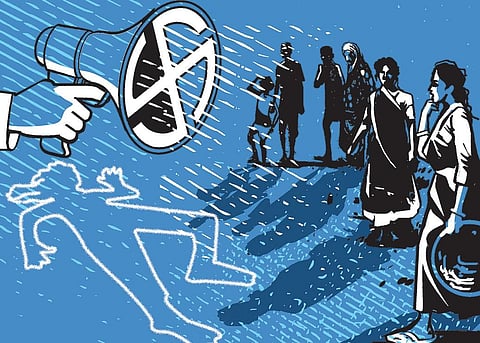

It is not the first time that caste goons have brutally murdered a Dalit woman, nor is it going to be the last. In a country, where rape is a way of life, we need not mention the caste of the victim, argue many. It was not long ago when a government was brought down after the brutal rape and murder of a woman in Delhi. It frustrates some that politicians of all hues are using this as an opportunity to further their career. Some are using this to consolidate their vote banks, others to find theirs and some others to calibrate their responses as per the delicate caste equations of their constituencies.
When the circus of an important state election is approaching, can clowns be far behind? Every rape is condemnable, so why this case in Uttar Pradesh is being discussed so much? In a country that sees almost 90 rapes a day (notwithstanding the low reporting), why are we discussing the caste of the victim, many ask from their bubble of urban upper-class privilege. No one discussed the caste of the unfortunate victim of the infamous Delhi rape, isn’t it? Statistics are being hurled, inanities such as ‘this is so horrible, but…’ (fill some ‘whataboutery’ of your choice) are mouthed and there is a desperation to defend the indefensible.
A former Supreme Court Justice dutifully condemned the same in the social media when he took a break from his retirement pastime of mocking people based on their ethnicity or language. He also helpfully added the reasons for the great Indian rape trick. He listed all the possible, plausible, and probable reasons for rape, ranging from unemployment to lack of sexual education. It frustrated an MLA that Indians are not teaching their daughters ‘sanskar’ which, according to him, was the antidote for rape. Governance, or lack of it, cannot prevent rape, said the wise man. Ironically, all these judicious words of advice may have gone to waste, for the authorities now claim that the victim was never raped at all.
For now, they agree the woman was murdered and did not die of a heart attack or suicide. Let us thank the 33-crore compassionate gods for such small mercies. All rapes are not equal. Though all violations are abhorrent, rape as a tool of punishment, oppression and submission is an Indian reality. Lust plays a minor part in this show of power. Even the miniscule betterment in the lives of the oppressed castes triggers the itch in the dominant castes to teach them a ‘lesson’, show them their ‘place’, and perpetuate the age-old system of a few at the apex and the rest in silos of varying caste hierarchy. Caste is not unique to India, and all societies in the world had it in one form or another.
Some came out of it, while many countries like the US still struggle with racism. Unlike racism where one race oppresses the other, caste hierarchy is a complex system where every layer oppresses the ones below it and gets discriminated by the layers above it. In such deeply patriarchal and unequal societies, being a woman of any caste is a misfortune, and being a Dalit woman at the bottom of the pyramid is a catastrophe. How much ever the upper castes deny it, caste is a brutal reality in India. Not that Indians have not been aware of this scourge ever.
The rebellion against caste in India is as old as the Varna system that laid the foundation of Jaati. For many thousands years, many saints and social reformers—from Basaveshwara, Kabir, Nanak and Narayana Guru to Mahatma Gandhi—have tried to address it within the system and some like Ambedkar gave up the internal reform attempt as hopeless and left the religion of his birth. Yet like a bloodstain that refuses to go, this abhorrence still lingers in the fabric of our society. In urban India, the stain might be faint, manifesting itself only in matrimonial columns or as hushed whispers about colleagues in office corridors, masked by a pretentious civility.
In the rural hinterland, it assumes its ‘Viswaroopa’, with its myriad heads and a thousand hands, all carrying many brutal weapons of murder, pillage, and arson. Rape is just one weapon in its armoury.
To deny caste oppression is to deny reality. That is why the present discourse on the unfortunate incident in UP is important. It is not just a crime by a few unemployed youths. It is a way of life that needs a complete overhaul.
The price of privilege is the moral duty to act when one sees another person treated unfairly. And the least that a person in the dominant caste can do is not make the pain any worse, says Isabel Wilkerson in her Pulitzer-winning book, Caste: The Origins of Our Discontents. Along with the Annihilation of Caste, by Dr B R Ambedkar, we must teach Wilkerson’s seminal work to every Indian. Maybe then we would get a ‘sanskar’ worth emulating for future generations to come.
Anand Neelakantan
Author of Asura, Ajaya series, Vanara and Bahubali trilogy mail@asura.co.in